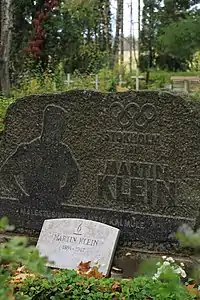 Martin Klein (right) vs. Alfred Asikainen at the 1912 Olympics | |
| Personal information | |
|---|---|
| Nationality | Estonian |
| Born | 12 September 1884 Tarvastu, Kreis Fellin, Governorate of Livonia, Russian Empire |
| Died | 11 February 1947 (aged 62) Tarvastu, Estonia |
| Height | 1.74 m (5 ft 9 in) |
| Weight | 75–80 kg (165–176 lb) |
| Sport | |
| Sport | Greco-Roman wrestling |
| Club | Sanitas, St. Petersburg |
Medal record | |
Martin Klein (12 September 1884 – 11 February 1947) was an Estonian wrestler who competed for the Russian Empire at the 1912 Summer Olympics.[1] He won the silver medal in the middleweight class, becoming the first Olympic medalist born in the territory of modern Estonia.[2] In the semifinal against the reigning world champion Alfred Asikainen,[3] the two grappled for 11 hours and 40 minutes on a sunny day outdoors, until Klein managed to pin Asikainen. Klein was so exhausted from the bout – the longest wrestling match ever recorded – that he was unable to wrestle for the gold the next day, leaving Swedish wrestler Claes Johansson with the gold medal.[4]
Biography
Klein was born to a farmer and started training in wrestling only in his twenties. He left home aged 17 to work as a sailor, but after two years, together with his brother, signed up to a factory in Saint Petersburg, which was then the capital of the Russian Empire. Seeking additional incomes, he became a night-shift guardian in a wrestling club and in this way was introduced to the sport.[4]
In 1910 Klein won his first title, at St. Petersburg Championships in the unlimited class. Besides the 1912 Olympics, he also competed at the 1913 World Championships, but withdrew due to a hand injury. The same year he won the Russian heavyweight title. During World War I he served in the Russian army and later took part in the Estonian War of Independence. In 1919 he became a wrestling coach and prepared Estonian wrestlers for the 1920 Olympics. At those Games he was also offered a place as a competitor, but refused in favor of his younger teammates. Klein continued coaching and competing in wrestling in Estonia until 1937. He died as a consequence of a hernia, which he developed when moving logs and was buried in the Tarvastu cemetery. Since 1962 an international Martin Klein Memorial in Greco-Roman wrestling is held in Viljandi, Estonia.[4]

References
- ↑ "Martin Klein". Olympedia. Retrieved 13 June 2021.
- ↑ "Exhibition "For the First Time in London" introduces London 2012 Games and the Estonian Olympic history". British Embassy, Tallinn. Retrieved 11 June 2012.
- ↑ Asikainen represented Finland, which was then part of the Russian Empire, but was competing as a separate team, under the Russian flag.
- 1 2 3 "Martin Klein Olympic Results". sports-reference.com. Archived from the original on 17 April 2020. Retrieved 21 May 2013.